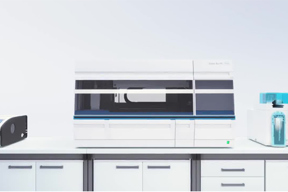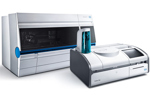
As part of Roche, CustomBiotech has been a leader in supplying innovative, high-quality products to forward-thinking biopharma and diagnostics businesses for more than 50 years. Our pioneering biopharma and diagnostic experts work together at one of Europe’s largest and most productive biotechnology centers. This is where Roche continually creates a wide range of drugs and diagnostics, including critical raw materials, ingredients, quality control kits and in-process analyzers.
In the fast-paced, volatile healthcare industry, you must stay ahead of your competition while continuing to raise the standards of care.
Roche CustomBiotech is a reliable partner who:
- Invests in the innovations and quality assurance that can elevate your biopharma and diagnostic business
- Offers a secure and compliant global supply chain
- Can co-create solutions to the specific needs of your business
Our high-quality raw materials and reliable service will help you grow your business and deliver better healthcare products.
VIDEOS

Solutions For Cell Analysis Metabolite Testing
Learn about a family of instruments that performs precise measurements and enables informed decisions and fast time response.

Optimizing Upstream High-Throughput Biologics Development
Learn about designing large Design-of-Experiment (DOE) upstream process development studies and the elements that could positively or negatively effect your throughput.
CONTACT INFORMATION
Roche CustomBiotech
9115 Hague Road
Indianapolis, IN 46250
UNITED STATES
Phone: 1-800-428-5433
FEATURED INSIGHTS
-
Explore temperature effects on product titer, automated cell culture development workflow, maximizing product life-cycle efficiency with the right DOE strategy, and effective data management.
-
Learn about a solution for streamlining workflow in novel biologics while collecting quality data, by combining single-use microbioreactors with advanced automation and analytical platforms.
SOLUTIONS
-
Propelling Cell And Gene Therapies From Concept To Commercialization
Roche CustomBiotech is committed to advancing cell and gene therapies by offering specialized solutions for manufacturing high-quality cell and gene therapeutics.
-
Uncoupling Yield From Quality: The Glycoengineering Advantage
Streamline your biologics workflow, from initial development to final manufacturing, with comprehensive and high-quality solutions for consistency and efficiency.
-
Advance The Potential Of Your Cell Culture
Explore modern solutions for monitoring and analyzing cell culture in the pharmaceutical and biotech sectors.





